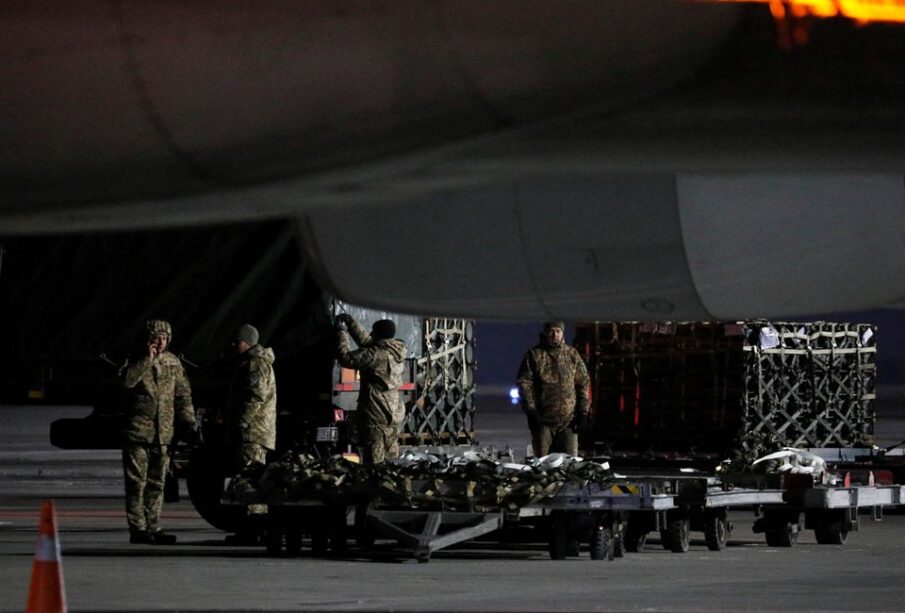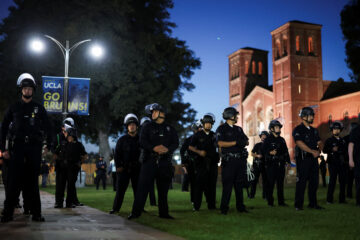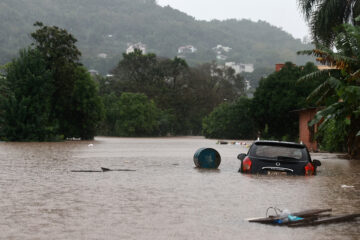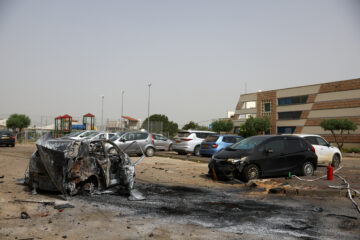Western countries step up response plans over fears Russia may invade Ukraine
 Ukrainian service members unload a shipment of military aid delivered as part of the United States of America's security assistance to Ukraine, at the Boryspil International Airport outside Kyiv, Ukraine January 25, 2022. REUTERS/Gleb Garanich
Ukrainian service members unload a shipment of military aid delivered as part of the United States of America's security assistance to Ukraine, at the Boryspil International Airport outside Kyiv, Ukraine January 25, 2022. REUTERS/Gleb GaranichWestern leaders stepped up preparations for any Russian military action in Ukraine on Tuesday, with talks taking place on protecting energy supplies and U.S. President Joe Biden saying he would consider imposing direct sanctions on President Vladimir Putin.
Tensions remained high after NATO said on Monday it was putting forces on standby and reinforcing eastern Europe with more ships and fighter jets in response to Russia’s troop build-up near its border with Ukraine.
Russia, which denies planning an attack, said it was watching with “great concern.” Kremlin spokesman Dmitry Peskov repeated Moscow’s line that the crisis was being driven by U.S. and NATO actions, not the Russian troop build-up.
Ukrainian President Volodymyr Zelenskiy, in a televised address on Tuesday evening, urged his compatriots to stay calm and said work was underway to bring about a meeting between him and the leaders of Russia, Germany and France.
“There are no rose-colored glasses, no childish illusions, everything is not simple. … But there is hope,” Zelenskiy said. “Protect your body from viruses, your brain from lies, your heart from panic.”
Biden repeated that there were no plans to send U.S. troops to Ukraine, which is not a NATO member, but said he would consider imposing direct sanctions on Putin and that there would be “enormous consequences” worldwide if Russia invaded.
If Russia were to move into Ukraine with all its forces, it would be the “largest invasion since World War Two” and would “change the world,” Biden said.
Reporters asked Biden if he would see himself imposing sanctions on Putin if the Russian president invaded Ukraine.
“Yes,” Biden responded. “I would see that.”
Direct U.S. sanctions on foreign leaders are rare but not unprecedented. Others who have faced sanctions include Venezuela’s Nicolas Maduro, Syria’s Bashar al-Assad and Libya’s Muammer Gaddafi.
The U.S. Defense Department has said about 8,500 U.S. troops have been put on heightened alert and are awaiting orders to deploy to NATO’s eastern flank. Biden said on Tuesday he may move the troops in the nearer term.
A U.S. plane carrying military equipment and munitions landed in Kyiv on Tuesday, the third shipment of a $200-million security package to shore up Ukraine.
Western leaders have said unity is paramount, though differences have emerged among European nations over how best to respond.
“It is absolutely vital that … the West is united now, because it is our unity now that will be much more effective in deterring any Russian aggression,” British Prime Minister Boris Johnson told parliament, urging “our European friends” to be ready to deploy sanctions as soon as there was any incursion.
Johnson said Britain was discussing with the United States the possibility of banning Russia from the SWIFT global payments system.
French President Emmanuel Macron said he would seek clarification over Russia’s intentions in a phone call with Putin set for Friday. Political advisers from Russia, Ukraine, Germany and France are due to meet in Paris on Wednesday.
Macron, Germany’s Chancellor Olaf Scholz and Spain’s foreign minister Jose Manuel Albares reiterated that Moscow would pay a high price if it attacked Ukraine.
Russia, which has tens of thousands of troops near Ukraine, is demanding security guarantees from the West, including a promise by NATO never to admit Ukraine. Moscow sees the former Soviet republic as a buffer between Russia and NATO countries.
GAS DIVERSION PLANS
In Washington, senior Biden administration officials said the United States was in talks with major energy-producing countries and companies around the world over a potential diversion of supplies to Europe if Russia invades Ukraine.
Speaking to reporters on a call, the officials did not name the countries or companies involved but said they included a broad range of suppliers, including sellers of liquefied natural gas (LNG).
“We’ve been working to identify additional volumes of non- Russian natural gas from various areas of the world – from North Africa and the Middle East to Asia and the United States,” a senior administration official said, speaking on condition of anonymity.
The EU depends on Russia for around a third of its gas supplies. Any interruptions to its Russian imports would exacerbate an existing energy crisis caused by shortages.
An escalated conflict between Russia and Ukraine would likely further increase energy costs for many countries, keeping headline inflation rates elevated for longer, said Gita Gopinath, first deputy managing director of the International Monetary Fund.
The United States has committed more than $650 million of security assistance to Ukraine in the past year and more than $2.7 billion in total since 2014, when Russia annexed Ukraine’s Crimea peninsula.
So far, NATO has about 4,000 troops in multinational battalions in Estonia, Lithuania, Latvia and Poland, backed by tanks, air defenses and intelligence and surveillance units.
SOURCE: REUTERS









